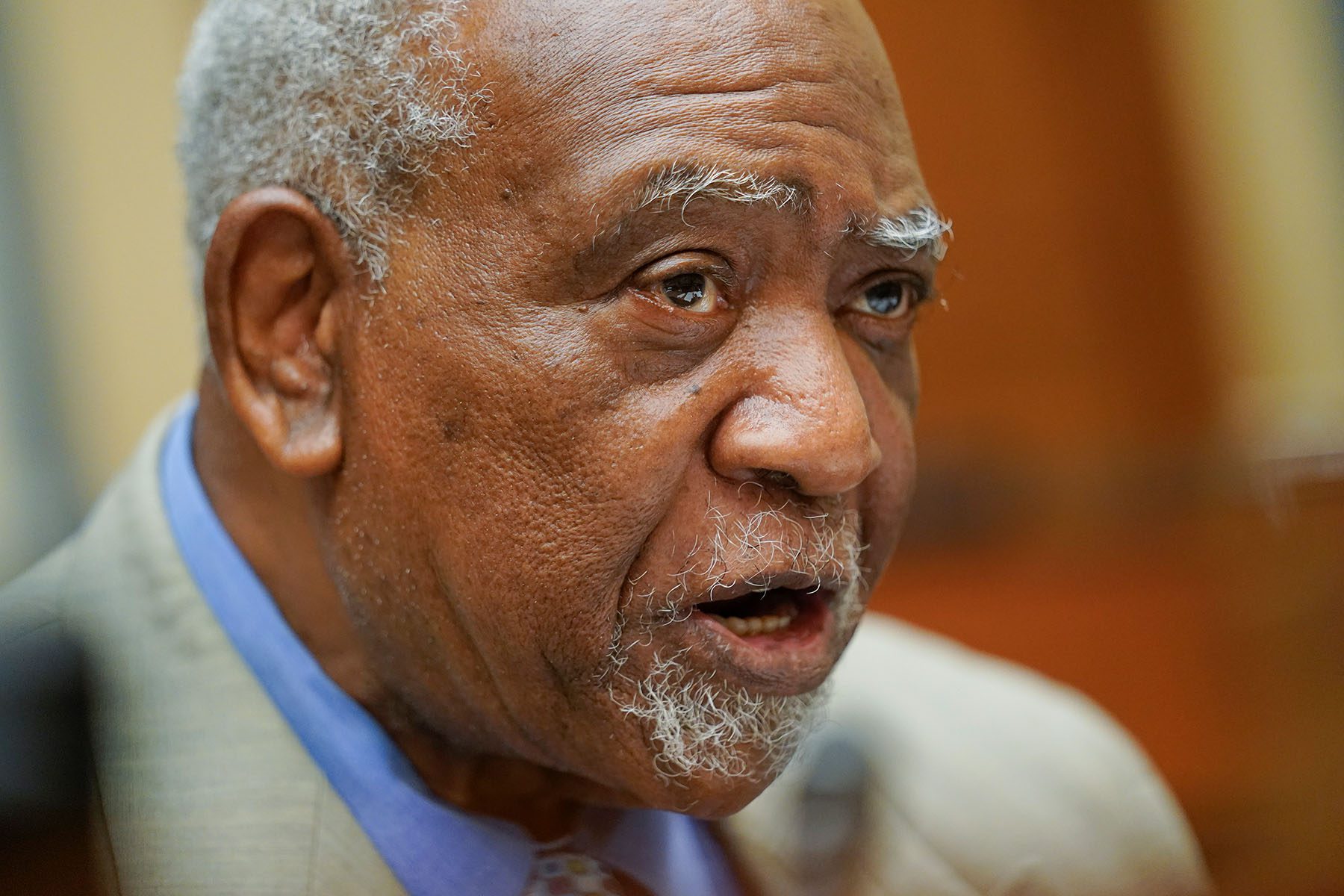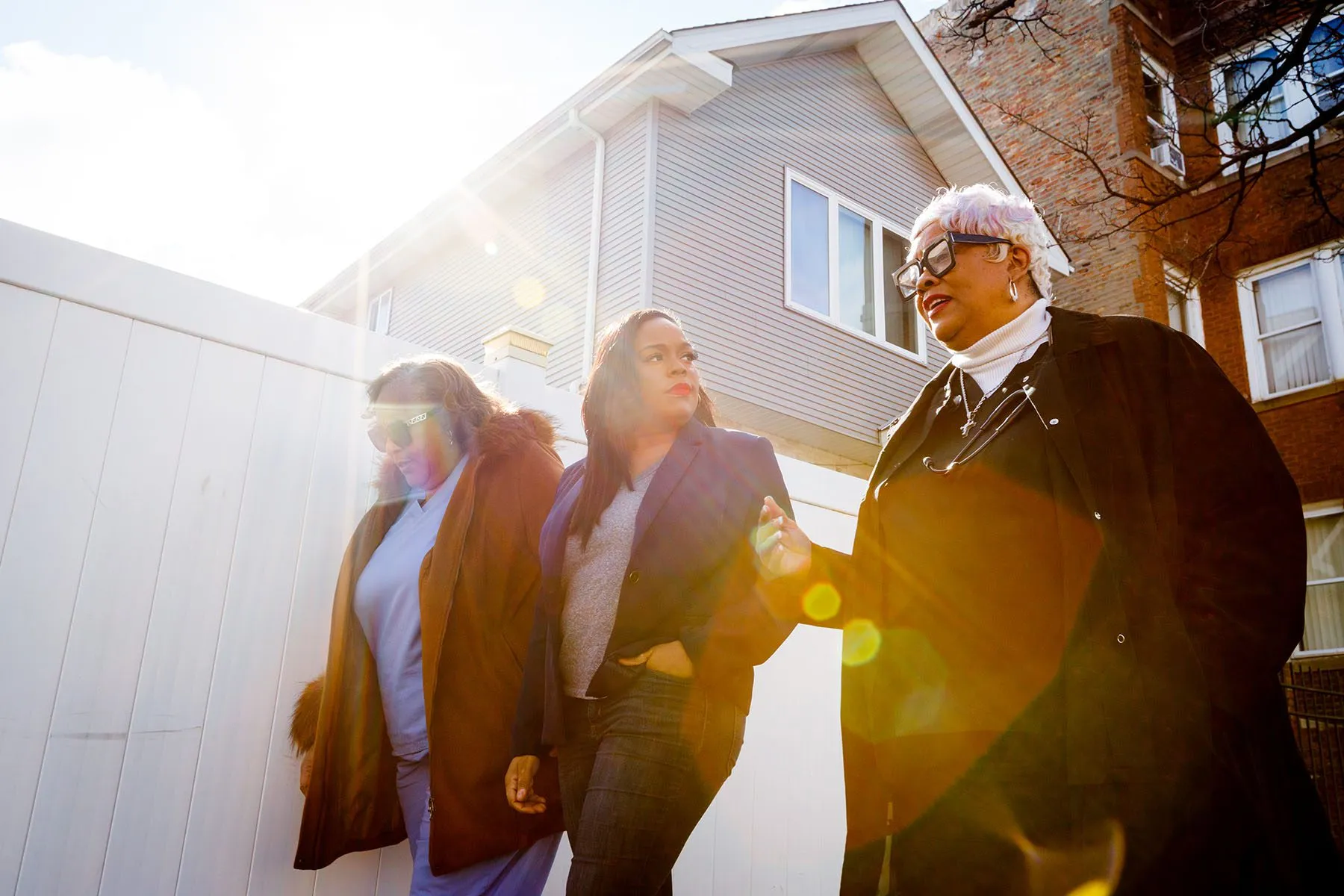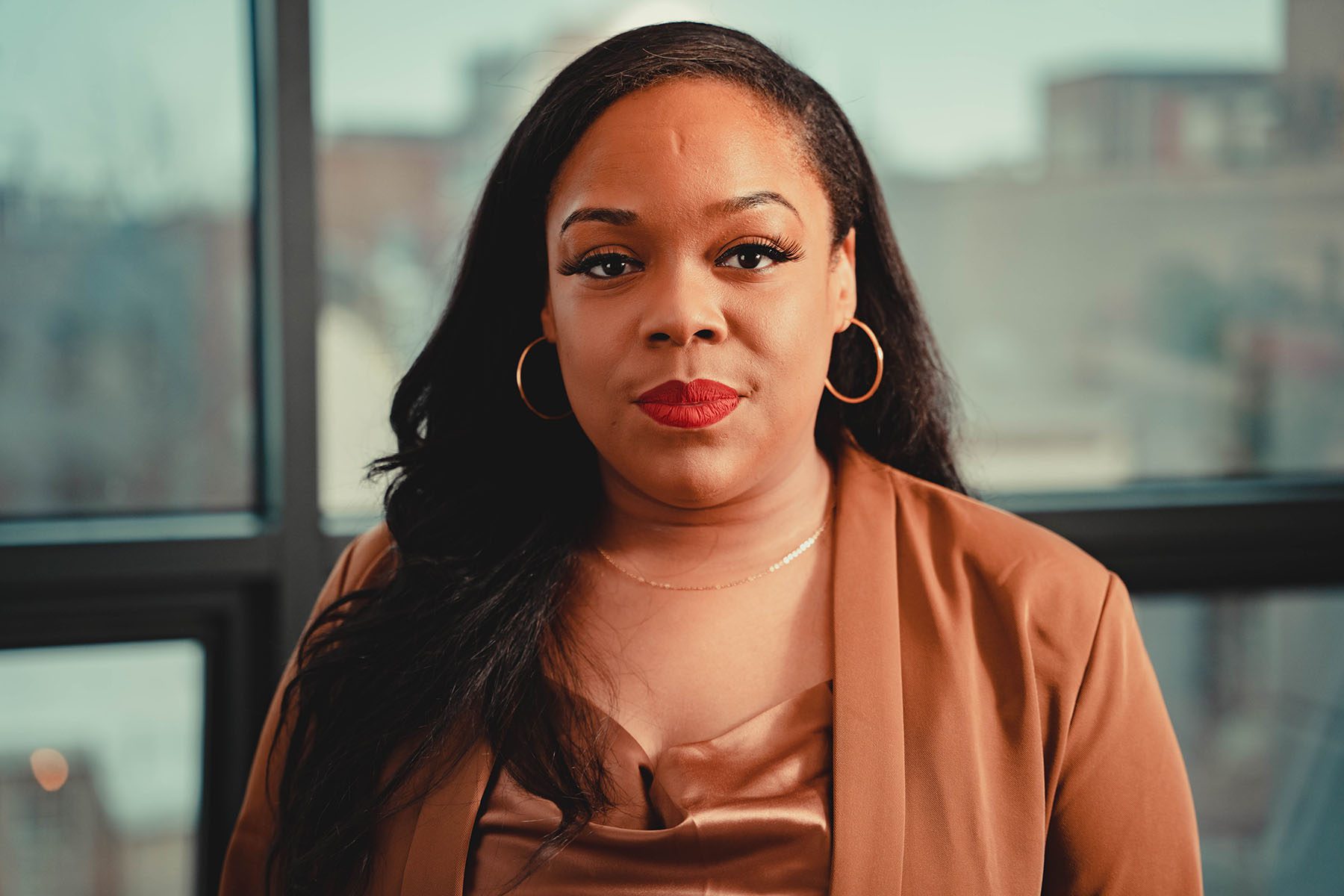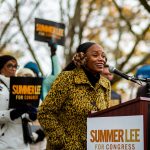When Kina Collins was still in elementary school, she witnessed a fatal shooting in front of her home on Chicago’s West Side. She knew the shooter — and the child who died.
Now, the gun violence prevention activist is running for the House of Representatives, and says she sees this political moment in time as “a fight for my life, literally.”
“What I knew, even as a child, was that the bullet was flying long before anybody pulled the trigger,” Collins told The 19th in a recent interview.
“The bullet flying, to me, is public school shutdowns; the lack of access to health care, including mental health services; the fact that we’re forced to live in a food desert. The fact that there are toxins in our air and lead in our water. All of that is violence against the community,” she continued.
Collins, 31, is competing in the Democratic primary Tuesday to represent Illinois’ 7th Congressional District, challenging longtime Rep. Danny Davis, a member of the Congressional Black Caucus who was first elected in 1996. The district is so heavily Democratic that there is not a Republican primary, so whoever wins Tuesday is all but sure to win again in November.
Collins tried to unseat Davis in 2020 but received only about 14 percent of the primary vote. This time around, she has support from progressive organizations like Justice Democrats, climate activism group the Sunrise Movement and the National Organization for Women. Justice Democrats in particular has raised and spent hundreds of thousands of dollars on Collins’ behalf.
-
More from The 19th
- ‘We have to break tradition’: New York’s Alessandra Biaggi thinks it’s time for a new type of Democrat
- Georgia Republicans drew one fewer Democratic district. Now at least one woman will lose her House seat.
- Donna Edwards was on a journey. Now, she wants to win her old House seat back.
The race has dynamics that have yielded success for other young progressive women of color challengers acting as activist messengers for the party’s next generation: a longtime incumbent in a heavily Democratic urban district who is protected by the party establishment but vulnerable to criticism they have become too complacent.
Collins says Davis does not have a sense of urgency about the myriad crises — climate, health care, gun violence, abortion access, voting — affecting their district.
“Congressman Davis has been my representative since I was 5 years old, and anything that you could have done in 25 years, you should have done it in 25 years,” Collins said.
Collins spoke to The 19th as the Senate finalized gun legislation that would bolster background checks for gun purchases by those 18 to 21 years old, create criminal penalties if an individual purchases a gun for someone else or trafficks firearms and close the so-called “boyfriend loophole” that allows domestic abusers not married to their partners to continue purchasing guns. “I don’t think that it goes far enough,” Collins said, noting that the law signed by President Joe Biden Saturday did not revive an assault weapons ban initially passed in 1994.
Biden endorsed Davis on Sunday. He is also supported by party leaders that include House Speaker Nancy Pelosi and Chicago Mayor Lori Lightfoot, as well as the Planned Parenthood Action Fund. Opportunity for All Action Fund, a new dark money group that backs incumbent Democrats facing progressive challengers, has spent hundreds of thousands of dollars supporting Davis, as has a political action committee run by Democratic lawmakers that likewise seeks to protect moderate incumbents.
A spokesperson from Davis’s congressional office, who also handles press for his reelection campaign, did not respond to a request to comment on his tenure or the primary race. Davis has not responded publicly to the Supreme Court’s decision on Friday gutting abortion rights. He angered progressives last year by saying R. Kelly deserved a second chance after being found guilty of sex trafficking women. Davis lost his grandson to gun violence in November 2016, and has tied the issue to systemic inequities, but likewise did not publicly respond to the school shooting in Uvalde, Texas, that created the momentum to pass the gun bill.

“There are a lot of urgent crises right now that are breaking out. Some of these fights are intergenerational fights, like workers’ rights, women’s rights, health care, but then there are urgent things like climate change that we have a timeline on and that we need to move on,” Collins said.
If elected, Collins would be the youngest Black woman to serve in Congress. She would also be the sixth candidate backed by Justice Democrats to unseat an incumbent on their way to Congress. All are either women or people of color: Reps. Alexandria Ocasio Cortez of New York, Ayanna Pressley of Massachusetts, Cori Bush of Missouri, Jamaal Bowman of New York and Marie Newman of Illinois.
Newman, who was just elected in 2020, is competing Tuesday in one of six House primaries — four Democratic, two Republican — that pit incumbents from the same party against one another due to redistricting.
Justice Democrats encouraged Collins to run again after contacting nearly 200 community leaders, union members and activists in the Chicago area and vetting four candidates. The group assists progressive working-class candidates who may not have access to traditional financial support structures by providing staff to help with branding, creating launch videos, hosting fundraisers and running independent television and digital ads. All of their candidates reject raising money from corporate political action committees.
Justice Democrats spokesperson Waleed Shahid said Collins “has the exact kind of leadership experience we need more of in the Democratic Party” since she was a “community organizer fighting for racial justice and public safety and someone standing up to the corporate control of our democracy.”
Collins said if she is elected to Congress she will be “laser focused” on closing the gap in life expectancy in her district versus the surrounding areas, one of the largest disparities in the country. In her first 100 days she aims to convene an interdisciplinary life expectancy task force of doctors, activists, parents, educators and environmentalists to methodically “chip away” at that gap by examining the intersectional impacts of gun violence, health care access and access to clean water and air, she said.
“If you live in downtown Chicago, you live to the age of 90. If you take a 30-minute car ride to the South Side of Chicago, to another working-class Black community … your life expectancy drops to 60. A 30-year life expectancy gap in a 30-minute car ride,” Collins said.

The Supreme Court’s ruling Friday overturning Roe v. Wade, which for 50 years has protected abortion access, only raises the stakes, Collins said. Illinois has strong abortion protections, and leaders there expect an influx of people from neighboring states that have, or are poised to, restrict abortion care. Collins worries that could overwhelm Chicago’s clinics and make care even harder to find for the district’s residents, roughly half of whom are Black. At about 43 deaths per 100,000 births, the maternal mortality rate for Black women is more than twice what it is for White women in the United States.
“I think it’s even more of a reason that we need to send a fighter to Congress in our district,” Collins said. “I am mad as hell about what is happening right now and I think that we need to be as full-throated as possible about utilizing every possible option to maintain bodily autonomy for people across this country who can get pregnant.”
“For me, reproductive justice and health care is, for Black women in particular, it’s not just about contraceptives and abortion — it’s about the difference of whether we live or die, so this is a fight for my life, literally,” she added.







